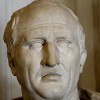“ Even if a man knows the better part he will not be angry with others; for he knows also that more than human virtue is needed to save a man, and that he only praises justice who is incapable of injustice. ”
Plato, The Republic. copy citation
| Author | Plato |
|---|---|
| Source | The Republic |
| Topic | justice virtue |
| Date | |
| Language | English |
| Reference | |
| Note | Translated by Benjamin Jowett |
| Weblink | http://www.gutenberg.org/files/1497/1497-h/1497-h.htm |
Context
“'How can we resist such arguments in favour of injustice? Add good manners, and, as the wise tell us, we shall make the best of both worlds. Who that is not a miserable caitiff will refrain from smiling at the praises of justice? Even if a man knows the better part he will not be angry with others; for he knows also that more than human virtue is needed to save a man, and that he only praises justice who is incapable of injustice.
'The origin of the evil is that all men from the beginning, heroes, poets, instructors of youth, have always asserted "the temporal dispensation," the honours and profits of justice. Had we been taught in early youth the power of justice and injustice inherent in the soul, and unseen by any human or divine eye, we should not have needed others to be our guardians, but every one would have been the guardian of himself.”
source


